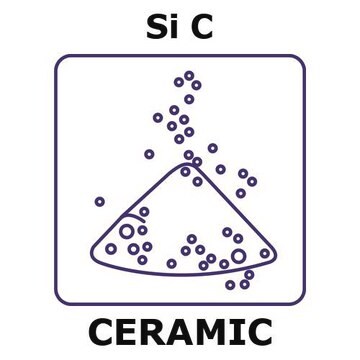594911
Siliziumcarbid
nanopowder, <100 nm particle size
Synonym(e):
Carbon silicide, Carborundum, Methanidylidynesilanylium, Silicon monocarbide
About This Item
Empfohlene Produkte
Form
nanopowder
Qualitätsniveau
Oberflächenbereich
70-90 m2/g
Partikelgröße
<100 nm
mp (Schmelzpunkt)
2700 °C (lit.)
Dichte
3.22 g/mL at 25 °C (lit.)
Schüttdichte
0.069 g/cm3
SMILES String
[C-]#[Si+]
InChI
1S/CSi/c1-2
InChIKey
HBMJWWWQQXIZIP-UHFFFAOYSA-N
Suchen Sie nach ähnlichen Produkten? Aufrufen Leitfaden zum Produktvergleich
Verwandte Kategorien
Allgemeine Beschreibung
Anwendung
- Overview of silicon carbide power devices: This document provides a comprehensive review of the characteristics and applications of silicon carbide (SiC) in power devices, discussing its advantages over traditional silicon devices in handling high voltages and efficiencies (Choi, 2016).
Physikalische Form
Lagerklassenschlüssel
11 - Combustible Solids
WGK
nwg
Flammpunkt (°F)
Not applicable
Flammpunkt (°C)
Not applicable
Persönliche Schutzausrüstung
dust mask type N95 (US), Eyeshields, Gloves
Hier finden Sie alle aktuellen Versionen:
Besitzen Sie dieses Produkt bereits?
In der Dokumentenbibliothek finden Sie die Dokumentation zu den Produkten, die Sie kürzlich erworben haben.
Kunden haben sich ebenfalls angesehen
Artikel
Composite materials that traditionally incorporate micron scale reinforcements in a bulk matrix offer opportunities to tailor material properties such as hardness, tensile strength, ductility, density, thermal and electrical conductivity, and wear resistance.
Silica is a very popular inorganic nanomaterial used in a wide range of applications including fillers for rubber, catalyst supports, separation media, carriers in food and agriculture, and abrasive/anticaking agents in cosmetics. It is also widely believed to be an important material for biomedical applications for following reasons.
Advanced Inorganic Materials for Solid State Lighting
Unser Team von Wissenschaftlern verfügt über Erfahrung in allen Forschungsbereichen einschließlich Life Science, Materialwissenschaften, chemischer Synthese, Chromatographie, Analytik und vielen mehr..
Setzen Sie sich mit dem technischen Dienst in Verbindung.



